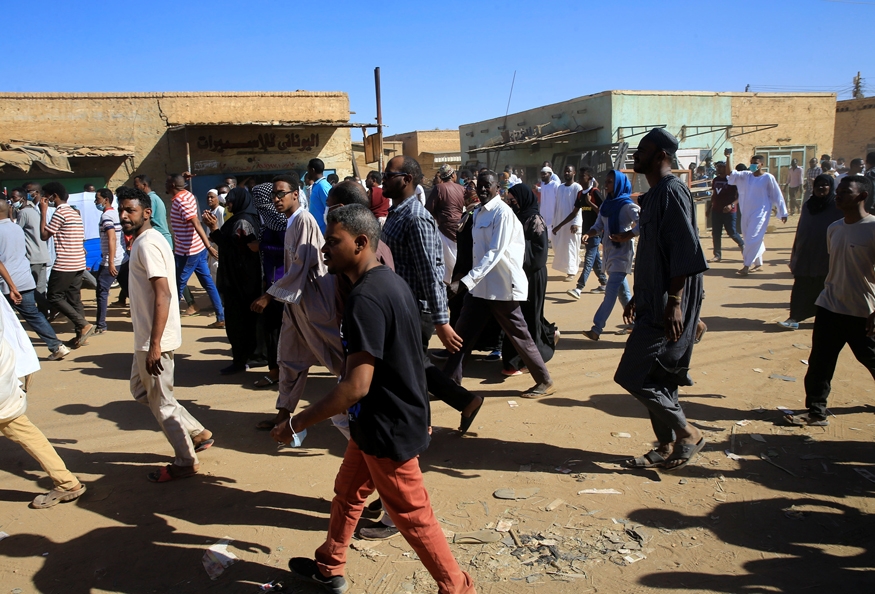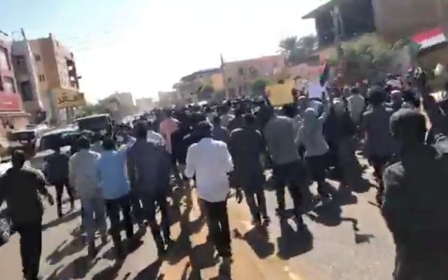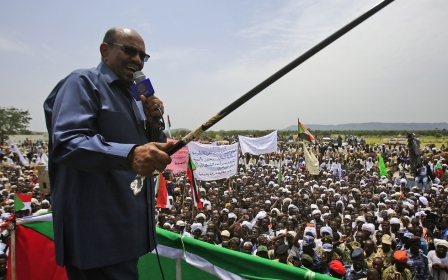Sudan human rights body condemns use of live ammunition against protesters

Sudan's National Human Rights Commission, the top governmental human rights body, has condemned the killing "by bullets" of protesters during the ongoing wave of protests across the country, calling on the authorities to bring those responsible to justice.
The statement on Friday marks the first acknowledgement by a Sudanese state agency that live ammunition has been used since anti-government protests erupted last month.
"We condemn using bullets against citizens," said the commission, whose members are appointed by President Omar al-Bashir.
The human rights body stopped short of identifying those who fired the live ammunition, as well as who may have ordered its use against demonstrators who have been calling for Bashir to step down amid tensions over rising living costs.
While also criticising the firing of tear gas at hospitals, the commission called on the government "to investigate this and bring the criminals to court".
"We are also deeply sorry about the killing of citizens by bullets," it said.
The commission's statement came amid another day of anti-government protests, which began on 19 December when the government tripled the price of bread.
The demonstrations have since morphed into a wider movement calling for Sudan's longtime president to step down.
Tear gas fired at Khartoum protest
On Friday, security forces fired tear gas to disperse demonstrators who marched after noon prayers in the capital Khartoum, Reuters news agency reported.
The protests appeared to have drawn more people than before and were more widespread, Reuters said. In previous weeks, the protests began only after sundown.
Witnesses told the news agency that security forces used tear gas against dozens of demonstrators in al-Halfaya Bahri, an area in the south of Khartoum, and against a demonstration by dozens of people emerging from Sayed Abdel Rahman Mosque in Omdurman, which sits on the other side of the River Nile from the capital.
Security forces chased the demonstrators into side streets but there were no immediate reports of casualties, the witnesses said.
In Omdurman, army forces on mini-trucks with automatic guns were seen guarding a petrol station.
In a separate incident, witnesses said hundreds of demonstrators emerged from a mosque, known to be affiliated to Bashir's government, in the Jabra district of southern Khartoum chanting: "The people want the fall of the regime."
Footage posted on social media showed a stream of demonstrators pass by the mosque while chanting derogatory slogans against Bashir's administration. The authenticity of the recording could not immediately be verified.
North of Khartoum, demonstrators blocked the main road linking the capital to the Red Sea city of Port Sudan, witnesses said, without giving any further details.
Hospital attacked
While Sudanese officials said on Thursday that 22 people, including two security officials, have died since the protests broke out last month, Amnesty International said more than 40 people have been killed in more than 380 protests across the country since 19 December.
Human Rights Watch also said that at least 40 people, including children, have been killed in the protests, citing Sudanese activists and medical workers.
At least three people were killed in a protest in Omdurman on Wednesday, while eight people were hospitalised with gunshot wounds in the head, chest, stomach and legs, Amnesty said.
A group of doctors from the hospital, as well as Amnesty, said that police fired tear gas and live ammunition at the facility.
"Patients and doctors in Omdurman Hospital were attacked with tear gas and live bullets as Sudanese security forces ramped up their mission to suppress peaceful protests," Sarah Jackson, Amnesty's deputy director for East Africa, the Horn and the Great Lakes, said on Thursday.
The state rights commission urged Bashir to set up a fact-finding committee to look into the violence and called for a report into what happened in Omdurman.
"We are calling on all parties to protect hospitals, mosques and churches from any kind of violence or tear gas as these are protected areas," the commission said.
The protests that first broke over the price rise have quickly turned into anti-government demonstrations, with angry crowds calling for an end to Bashir's three decades in power.
Bashir has so far resisted calls for his resignation, accusing Western countries and other outside forces of orchestrating the protests against his rule and seeking to destabilise the country.
Stay informed with MEE's newsletters
Sign up to get the latest alerts, insights and analysis, starting with Turkey Unpacked
Middle East Eye delivers independent and unrivalled coverage and analysis of the Middle East, North Africa and beyond. To learn more about republishing this content and the associated fees, please fill out this form. More about MEE can be found here.




